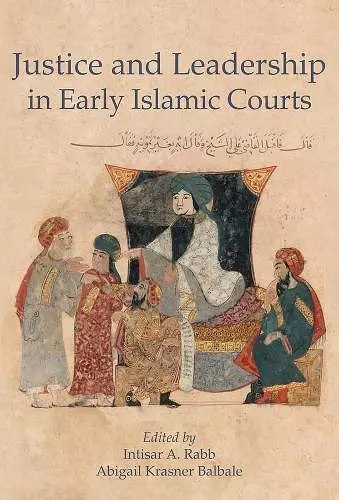Justice and Leadership in Early Islamic Courts
Abigail Krasner Balbale editor Intisar A Rabb editor
Format:Hardback
Publisher:Harvard University, Islamic Legal Studies
Published:31st Jul '18
Should be back in stock very soon

This book presents an in-depth exploration of the administration of justice during Islam’s founding period, 632–1250 CE. Inspired by the scholarship of Roy Parviz Mottahedeh and composed in his honor, this volume brings together ten leading scholars of Islamic law to examine the history of early Islamic courts. This approach draws attention to both how and why the courts and the people associated with them functioned in early Islamic societies: When a dispute occurred, what happened in the courts? How did judges conceive of justice and their role in it? When and how did they give attention to politics and procedure?
Each author draws on diverse sources that illuminate a broader and deeper vision of law and society than traditional legal literature alone can provide, including historical chronicles, biographical dictionaries, legal canons, exegetical works, and mirrors for princes. Altogether, the volume offers both a substantive intervention on early Islamic courts and on methods for studying legal history as social history. It illuminates the varied and dynamic legal landscapes stretching across early Islam, and maps new approaches to interdisciplinary legal history.
This book makes a valuable contribution to the literature. It will be widely used and appreciated by scholars and graduate students with an interest in the historical practice and development of Islamic law. -- Marion Katz, Professor of Middle Eastern and Islamic Studies, New York University
This book will be welcomed as a significant contribution toward a better understanding of the development of Islamic law in practice. Students of Islamic law have generally relied on the theoretical and ideal formulations of judicial procedure in manuals and chapters in textbooks that Muslim jurists wrote on dispensing justice. By contrast, this book offers path-breaking studies on Islamic legal practice by exploring biographical literature, local histories, and more, and by critically analyzing judicial contexts. These studies enlighten the reader about close interactions between jurists and judges on the one hand, and between judicial and political authorities, who kept revisiting concepts of the rule of law and of justice as they led the early Muslim societies, on the other. -- Judge M. Khalid Masud, Ad Hoc Member, Shariat Appellate Bench of the Supreme Court of Pakistan
ISBN: 9780674984219
Dimensions: 229mm x 152mm x 23mm
Weight: 590g
260 pages